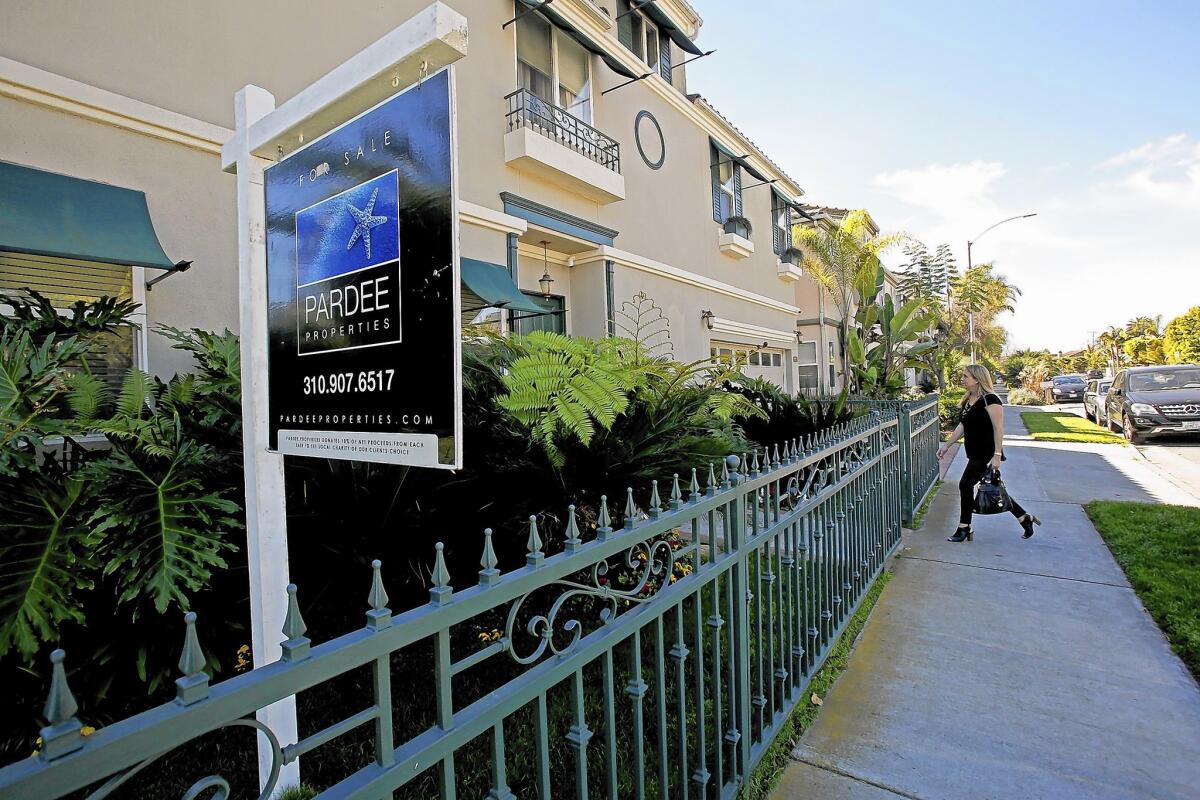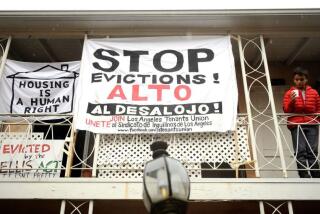Bill seeks to ease California’s affordability housing crisis

Most Californians can’t afford their rent.
The state’s affordability crisis has worsened since the recession, as soaring home prices and rents outpace job and income growth. Meanwhile, government funds to combat the problem have evaporated.
Local redevelopment agencies once generated roughly $1 billion annually for below-market housing across California, but the roughly 400 agencies closed in 2012 to ease a state budget crisis. In addition, almost $5 billion from state below-market housing bonds, approved by voters last decade, is nearly gone.
A state bill seeks to replace some of those funds and create more than 10,000 low- and moderate-income homes annually through a $75 fee for recording real estate documents. But the proposal has drawn criticism from some in the real estate industry who say it unfairly saddles homeowners and businesses with added costs.
“It disproportionally burdens one segment of the society with something that should be borne by the entire population,” said lobbyist Alexander Creel of the California Assn. of Realtors.
The bill, SB 391, would replace a portion of lost funds, $300 million to $720 million annually, depending how many documents are recorded. Those involved in a sale are exempt from the $75 fee.
State and federal funding for below-market housing in California has plummeted 79% over the last five years, according to a recent study from the California Housing Partnership, which supports the bill. California’s median inflation-adjusted rent, meanwhile, jumped more than 20% to $1,209 from 2000 to ‘12, according to census data.
According to another recent study, from the Joint Center for Housing Studies at Harvard University, more than half of California renters can’t reasonably afford their homes.
“We have a real crisis on our hands,” said state Sen. Mark DeSaulnier (D-Concord), who introduced the California Homes and Jobs Act last year.
With declining government support, planned below-market housing developments have stalled, advocates say.
“No one is sure when they can move forward with their projects,” said Matt Schwartz, president of the California Housing Partnership Corp., a state-created nonprofit organization dedicated to preserving low-income units.
About a year ago, Meta Housing Corp. opened a below-market senior housing development in Long Beach, but the 123-unit second phase has ground to a halt. Groundbreaking on an empty lot is nowhere in sight.
“It really depends when we can cobble together the cash,” said Aaron Wooler of Century Housing, a financier for low-income projects that is working on the development.
Meanwhile, demand for existing units is crushing. The waiting list for the first 200 units reached 1,200 households when the development opened, Wooler said. The waiting list has since dropped to 354 households.
Despite heavy demand, low-income projects don’t pencil out for most developers. Making money building apartments in California — where land and construction costs are high — requires charging high rents. The government subsidies enable developers to offer affordable rents for low- to moderate-income households, advocates say.
“The fact that the redevelopment agencies went away was a major hit,” Wooler said.
Critics of the agencies accused them of wasteful spending, making them politically vulnerable to Gov. Jerry Brown’s bid to close their doors. A 2010 Times investigation found that dozens of cities spent hundreds of millions of dollars earmarked for below-market housing without building a single such unit.
SB 391 places a $75 fee on recorded real estate documents, such as those required for a refinance, mechanic’s lien and foreclosure, among others. The Senate passed the bill during last year’s session, and it is now in the Assembly.
The bill faces opposition from the politically powerful California Assn. of Realtors, as well as credit unions that say struggling homeowners may shy away from refinancing. Creel, the Realtors group lobbyist, noted that the fee applies to each document recorded, and many transactions require more than one.
In most cases, two or three documents are filed for a refinance, and the borrower pays the fees, said Richard T. Cirelli, a Laguna Beach mortgage broker.
Christopher Thornberg of Beacon Economics said the bill doesn’t create nearly enough low-income units or tackle the root causes that have depressed new housing of all types and made units that do open extremely expensive. A far more efficient tack, Thornberg said, is to limit the ability of neighbors to challenge projects, which can delay development for years, even decades.
“Until you deal with those ... problems, housing is going to be extremely expensive in California,” he said.
But the bill serves as an important tool to combat the affordability crisis, supporters say. It has drawn backing from labor groups, developers, homeless advocates and mental health organizations. Business groups have also lent support, saying housing costs have soared so high that they hurt recruitment.
“It sometimes becomes a real challenge to find employees that are close enough that they want to come to work for you,” said Gary L. Toebben, president of the Los Angeles Area Chamber of Commerce.






